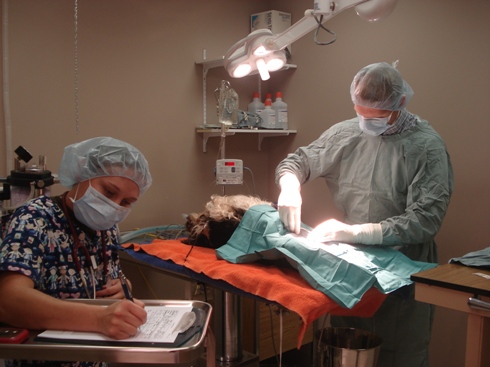|
What You Need to Know Before Your Pet's Upcoming Surgery
 Many people have questions about various aspects of their pet's surgery, and we hope this information will help. It also explains the decisions you will need to make before your pet's upcoming surgery. Many people have questions about various aspects of their pet's surgery, and we hope this information will help. It also explains the decisions you will need to make before your pet's upcoming surgery.
Is the anesthetic safe?
Just as in humans, there is always risk with anesthesia even in healthy animals. However, by using up-to-date anesthetic agents, anesthetic protocols and monitoring equipment, along with formally trained support staff, that risk is thankfully very low. Here at the Dissette Animal Hospital, we do a thorough physical exam on your pet before administering anesthetics to help ensure there are no obvious underlying illnesses that may affect anesthesia. We also tailor our anesthetic protocols and agents used to the individual needs of the pet taking into account the age, breed and general health of the pet.
Preanesthetic blood testing is important in reducing the risk of anesthesia. It is recommended that every pet have blood testing before surgery to ensure that the liver and kidneys can handle the anesthetic. Even apparently healthy animals can have serious organ system problems that cannot be detected without blood testing. If there is a problem, it is much better to find it before it causes anesthetic or surgical complications. If serious problems are detected, surgery can be postponed until the problem is corrected.
It is important that surgery be done on an empty stomach to reduce the risk of vomiting during and after anesthesia. You will need to withhold food for at least 8 to 10 hours before surgery. Water can be left down for the pet until the morning of surgery.
Will my pet have stitches?
For most surgeries there will be skin sutures that need to be removed 10-14 days after surgery. Most dogs and cats do not lick excessively or chew at the incision, but this is an occasional problem you will also need to watch for. You will also need to limit your pet's activity level for a time and no baths are allowed for the first 10 days after surgery.
Will my pet be in pain?
Anything that causes pain in people can be expected to cause pain in animals. Pets may not show the same signs of pain as people do; they often don't whine or cry, but you can be sure they feel it. Pain medications needed will depend on the surgery performed. Major procedures require more pain relief than things like minor lacerations.
Just as in humans, our pets will not be pain free after surgery however we take a very proactive approach to pain management. We start pain management before surgery and continue it during and after the surgical procedure, often continuing for several days after surgery depending on the type of surgical procedure. Most of our spay/neuter patients are back to themselves the day after surgery but some will require a longer course of pain medication.
What other decisions do I need to make?
When you bring your pet in for surgery, we will need to 5 to 10 minutes of time to fill out some paperwork. When you pick up your pet after surgery you can also plan to spend about 10 minutes to go over your pet's home care needs.
We will call you the night before your scheduled surgery appointment, to remind you of your appointment and to answer any questions you might have. In the meantime, please don't hesitate to call us with any questions about your pet's health or surgery.
Considering a high volume spay/neuter clinic? : Please read this document before you make this very important decision.
|